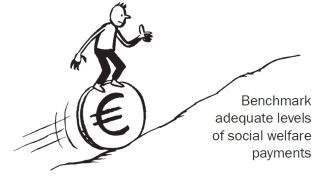Minimum social welfare rates should increase by €7 in Budget 2021

Government should increase in core social welfare rates of €7 per week in Budget 2021 and set a three-year target for Government to reach the benchmark of 27.5 per cent of average earnings. In the forthcoming Budget Government should also complete the equalisation of Jobseeker’s rates for young people under 26, introduce a cost of disability allowance and introduce a universal state pension.
Increase current social welfare rates by €7
Social Justice Ireland is proposing a €7 increase in core social welfare payments in Budget 2021. This would set Government on the correct path to benchmark social welfare rates to 27.5 per cent average weekly earnings over a three-year period, which was the standard set in 2007.
A lesson from past experiences of economic recovery and growth is that the weakest in our society get left behind unless welfare increases track increases elsewhere in the economy. Given the very difficult situation people across the country are in as a result of Covid-19, benchmarking minimum rates of social welfare payments to movements in average earnings is an important policy priority. Budget 2020 failed to deliver an increase to the minimum social welfare payment. A repetition of this failure in Budget 2021 would leave those who are most vulnerable in a very difficult position and see them fall further behind. This is not the time to repeat the mistakes of the past.
End the three-tier welfare system
In Budget 2021 Government should begin the process of indexing social welfare rates to the minimum essential budget standard, something that Social Justice Ireland has long been calling for. Indexation offers a resolution to the challenges posed by the ‘three-tier’ social welfare system that has been created as a result of Covid-19. It would also improve and reform the social welfare system, ensuring that it can adapt to the challenges we now face.
To start this indexation process in Budget 2021 social welfare rates should be benchmarked to 27.5 per cent of Average Weekly Earnings as the first step in a five-year pathway to index them to the Minimum Essential Budget Standard.
Summary of Social Justice Ireland proposals:
- Minimum Social Welfare rates: Minimum social welfare rates should increase by €7 per week in Budget 2021. This would see the basic social welfare rate rise to €210 in Budget 2021.
- State Pension contributory and non-contributory: Introduce a single-rate universal state social welfare pension from January 2021 at the rate of €255.30.
- Carer’s Support Grant: Increase the annual Carer’s Support Grant to €2,000 and extend the Carers GP Visit Card to those in receipt of Carer’s Support Grant.
- Domiciliary Care Allowance: Increase the domiciliary care allowance from €309.50 to €330. Expand the Free Travel Scheme to include people in receipt of the Domiciliary Care Allowance.
- Jobseekers rates – under 26: Continue the process started in Budget 2020 and equalise Jobseekers rates for all those under 26 at the increased rate of €210 per week.
- Cost of Disability: Introduce a cost of disability payment of €20 per week.
Social Welfare Benchmark
Just over a decade ago, Budget 2007 benchmarked the minimum social welfare rate at 30 per cent of Gross Average Industrial Earnings (GAIE). Today that figure is equivalent to 27.5 per cent of the new average earnings data being collected by the CSO. In 2020 the updated value of 27.5 per cent of average weekly earnings is projected to equal €221, implying a shortfall of €18 between current minimum social welfare rates (€203) and this threshold. Allowing for a likely increase in wages over the next three years, Budget 2021 should increase current minimum social welfare rates by €7 per week with a view to equalising the rates with the benchmark (27.5 per cent of average weekly earnings) over a three-year period.